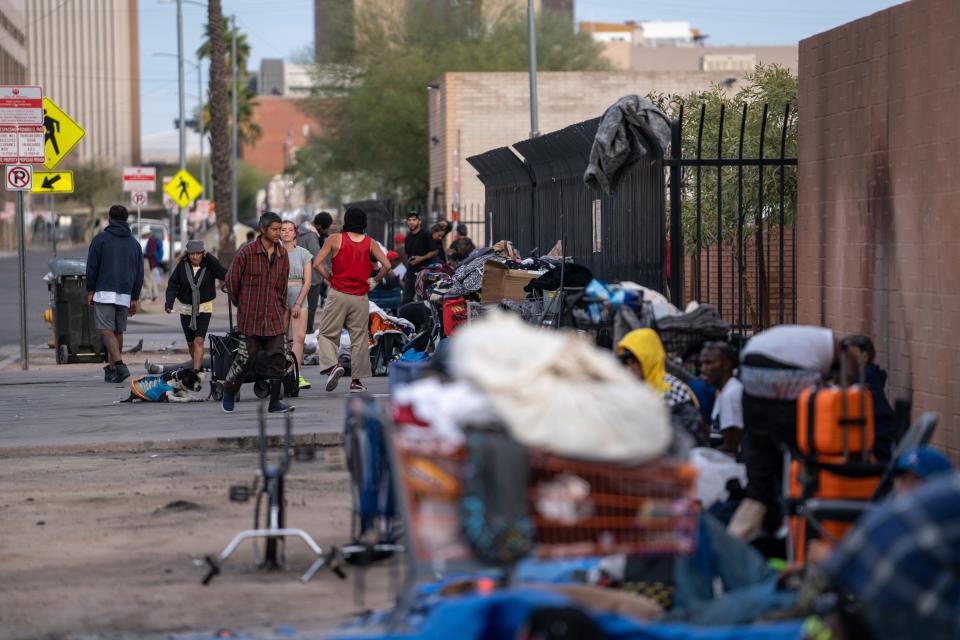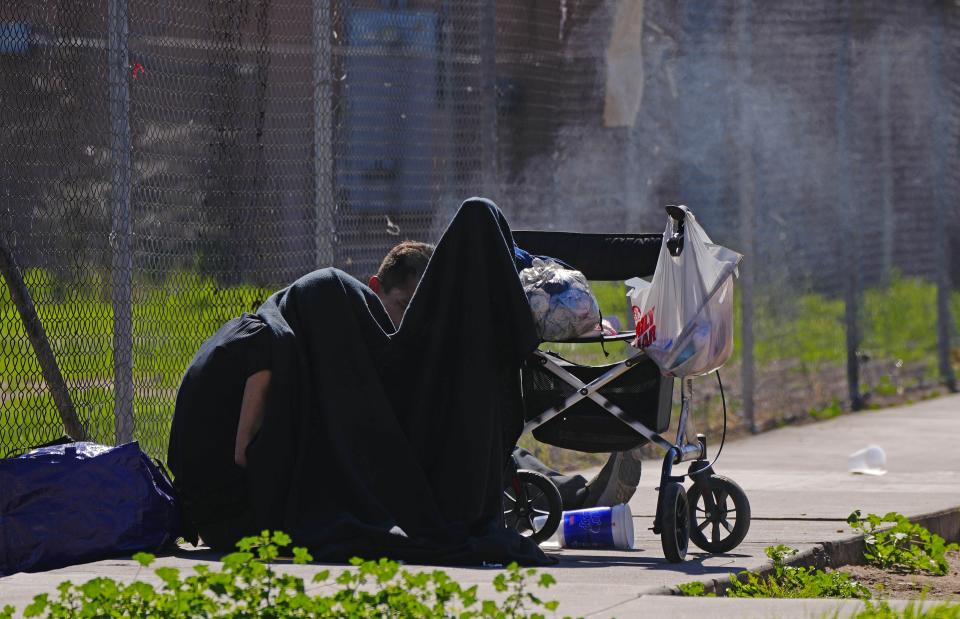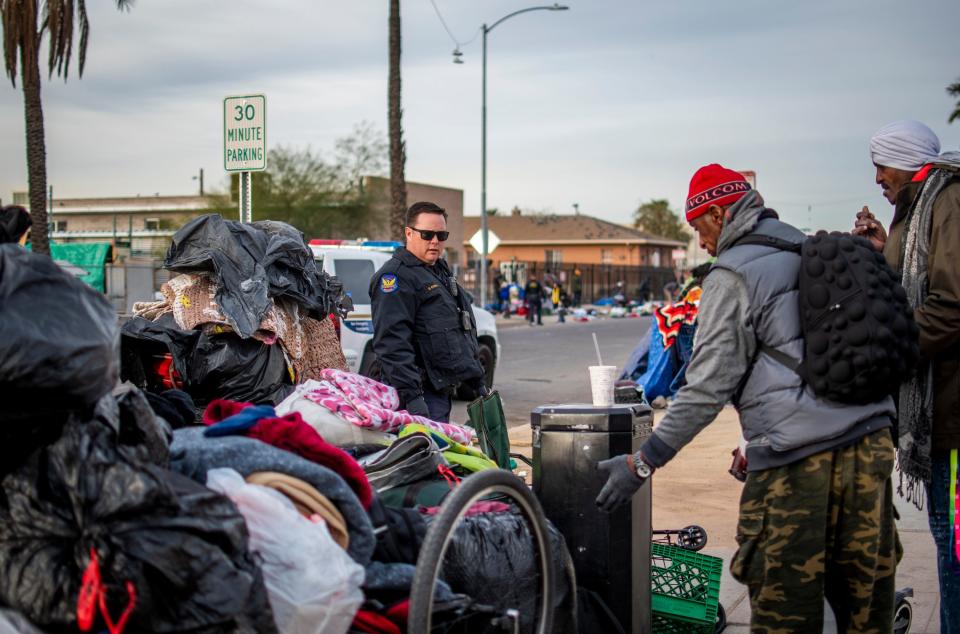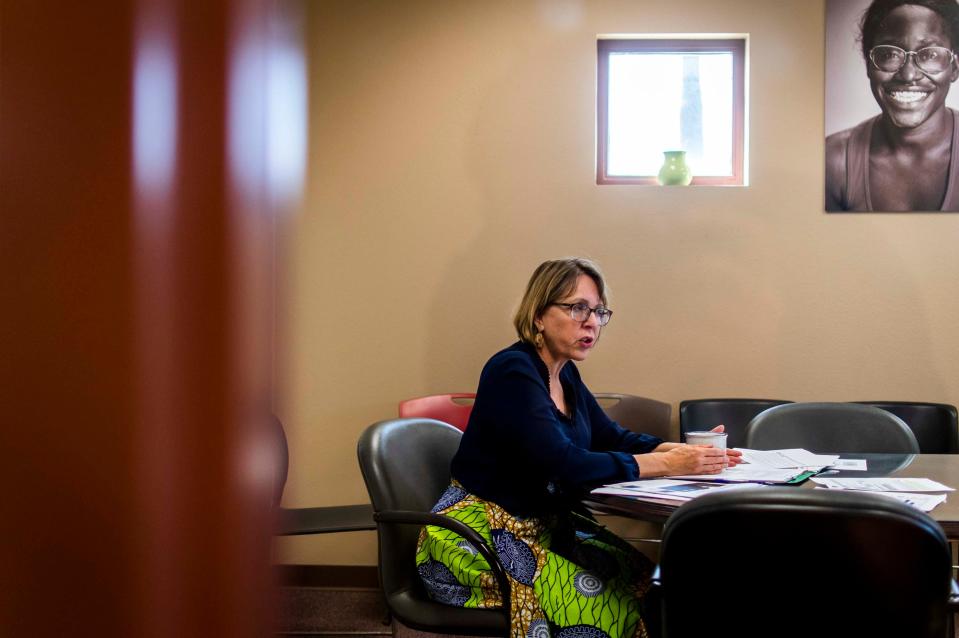Phoenix's downtown homeless shelter is short $1.5M. Could 'The Zone' come back?
Just when Phoenix thought it had cleared out "The Zone" downtown, nearby business owners and residents are raising the alarm again that the homeless encampment is making a comeback. It's about to get worse if the city's largest shelter provider can't fill its budget shortfall this month.
Central Arizona Shelter Services is short $1.5 million after the Arizona Department of Housing turned down three of the organization's multi-million-dollar grant requests this year.
This also comes after the Arizona Department of Economic Security ceased funding to CASS last year, CEO Lisa Glow said. At the same time the state cut support for the first time in roughly a decade, CASS' rent jumped nearly six-fold and ongoing costs skyrocketed after adding 130 beds in 2022.
City Council will vote on giving CASS a significant financial boost to help fill the gap at its voting meeting on Wednesday. From there, the provider should just need a few hundred thousand dollars to be in the clear.
Currently, Glow said CASS is at risk of having to cut 24-hour services, meaning the 600-bed facility at 12th Avenue and Madison Street will shut down for four hours per day, pushing clients back onto the street. Glow initially told the council it would be up to eight hours of closure but reversed course Tuesday, saying the demand was too high to cut eight hours.
"It's going to be felt more immediately in this neighborhood," Glow said.
It already is.

Local business owners say they’re seeing more people starting to camp along sidewalks in the mornings, as well as loitering and wandering in the afternoons around Madison, between Eighth and 13th avenues.
That’s at the heart of what was once The Zone, the makeshift sidewalk home for as many as 1,000 people.
“It’s a 24-hour problem here,” said Freddy Brown, president of PBF Manufacturing, a maker of caskets and other funeral-related products, on Jefferson Street and 12th Avenue. “So, whether (CASS is) open nights, days, or whatever, it’s going to continue to be a problem.”
If the situation worsens, Brown and other business owners and residents who sued the city in August 2022 over The Zone, claiming it was a "humanitarian crisis," are ready to ask the judge overseeing the case to hold Phoenix in contempt of its court order, said attorney Ilan Wurman.
Maricopa County Superior Court Judge Scott Blaney sided with business owners represented by Wurman and ordered Phoenix to clear out The Zone by November 2023.
Officials, who raced to successfully meet the deadline, don't want to backtrack.
As it cleared The Zone, Phoenix scrambled to find a place to shelter the people displaced. It proved as challenging as it was expensive.

Phoenix spent millions converting hotels to shelters and renovating facilities to house people on the streets to comply with Blaney's court order. The city-funded innovative shipping container homes for unhoused individuals and tried to open a new city shelter campus southwest of downtown.
Pre-construction work analyses showed severe contamination and torpedoed that plan, but Phoenix pivoted and bought state land for an outdoor, city-sanctioned campground. That site has been lauded by City Council members, and Office of Homeless Solutions staff say unhoused people found at The Zone after the November clean-up are offered space at the camp.
But as of Feb. 16, the campsite was housing fewer than 100 individuals, according to the city. Officials say it will eventually house up to 300 but construction has forced it to operate at lower capacity.
The need for shelter in Phoenix still outpaces available beds, making CASS' shortfall more dire.
"We have to get back to some kind of stabilization right now. We've all just been through a pandemic crisis, homeless crisis — We still have a homeless crisis," Glow said. "So, nothing has been the norm."
Kristin Couturier, spokesperson for Phoenix's Office of Homeless Solutions, said the city has been in constant contact with CASS and is working to provide funding for the provider.
Phoenix City Council approved an inflationary increase Feb. 7 to CASS' contract and called on other cities, the county and the state to brainstorm a more effective regional solution after Glow warned about the impending shortfall.
Councilwoman Laura Pastor suggested a regional contract between cities, potentially coordinated by Maricopa Association of Governments, or MAG. That's the regional agency charged with transportation planning and other countywide issues such as clean air and counting the homeless.
"We have to do it as a collective and as a bigger body of cities coming together," Pastor said.
Nearly every Valley city has struggled with homelessness in recent years.
Glendale launched the Homeless Solutions Alliance in May 2021, partnering with CASS to create a centralized hub for service providers and offer resources to the city’s homeless population. Tempe cleared a large encampment in the Rio Salado riverbed only for residents to rank homelessness as their top concern when unhoused people fanned out into city parks.
Surprise opened a housing support campus after seeing a spike in unhoused numbers in 2021. After years of no unhoused people in Fountain Hills, the small and affluent community registered one and two homeless people in 2022 and 2023, respectively, according to MAG's count.
Phoenix City Council will consider reallocating $1 million in leftover federal funds to CASS at its Feb. 21 meeting to fill the shelter provider's shortfall.
Mayor Kate Gallego said in a statement Tuesday the funding would ensure CASS doesn't cut any of its 600 beds, especially ahead of the deadly summer heat.
“There are more shelter beds in Phoenix than at any time in our city’s history and we’re committed to continuing to do everything we can to get those who are experiencing homelessness on the right track and into permanent housing," she said.
Glow said CASS will also seek funding opportunities outside Phoenix. The organization plans to petition the state to reconsider its grant applications, fundraise more from the private sector and solicit other municipalities, Glow said.
"It's just how fast can you move," she added. The federal funding is expected to run out by April.

What happens if the shortfall isn't filled?
Glow said the shelter would have to end 24-hour services in April if the $1.5 million gap isn't filled.
Sheltered individuals would need to leave the facility during the day, allowing CASS to save on personnel costs. There would be an exception, Glow said, for unhoused clients who work at night and therefore need a place to sleep during the day. Also, for seniors and medically vulnerable people experiencing homelessness.
The savings wouldn't cover the full deficit though, so next on the chopping block would be case managers. Glow said it's an "unfeasible" option, given there are only four case managers now for the entire 600-person shelter.
The worst-case scenario would be cutting beds, Glow said, but she doesn't anticipate that happening.

As need increases, state funding for CASS goes away
Glow said the organization's shortfall comes from losing out on millions in grants from the Arizona Department of Housing at the same time the Arizona Department of Economic Security stopped funding shelters.
CASS applied for three grants totaling $7.9 million from the state housing department's first-ever Homeless Shelter and Services Fund. The fund set aside $20 million in grants to cities and $40 million to organizations and cities, but CASS got nothing.
State officials said there was an extraordinary need and limited resources.
More than 100 applications were submitted, collectively worth $275 million in requests.
“Not all requests for funding could be approved,” department CEO Joan Serviss explained in an email.
Since 2020, the department has awarded CASS more than $9 million in grants for projects and initiatives such as shelter services, eviction prevention, strategic planning, and most recently, rapid re-housing. The lion’s share of those awards was a $7.5 million grant in 2021 for property acquisition.
When asked whether anything had changed this past year that led to the denials, Serviss said the grants are not like ongoing annual appropriations. Organizations, she continued, can apply for grants within the department’s “competitive environment” when there are funds available.
Meanwhile, CASS' roughly $1.5 million it was getting from DES annually for the past decade ended last year, Glow said. She asked if the funding would return but hasn't been updated, she said.
Spokespeople for DES did not immediately respond to questions about the funding.
Glow said CASS was held over by federal COVID-19 relief funds the governor's office provided, but those funds are now running out.
CASS' costs haven't stopped growing, though. The downtown shelter expanded from 470 to 600 beds in 2022 and increased services to 24 hours per day to address Phoenix's rising homelessness crisis. Doing so raised CASS' operational costs, Glow said.
From fiscal years 2021 to 2023:
CASS' rent and pass-through costs at Keys Campus rose 490%, from $168,000 to $992,000.
CASS' security costs rose 40%, from 480,000 to $680,000.
CASS' labor costs rose 40% from $1.5 million to $2.1 million.
CASS' supply costs rose nearly 480%, from $27,000 to $157,000.
CASS' most significant expenditure was rent and "pass-through" fees paid to its landlord, Keys to Change, which owns and operates the Keys Campus. The fees pay for utilities, security, janitorial services, parking lot maintenance and groundskeeping, according to Keys to Change spokesperson Steve Carr.
The increase in pass-through fees stemmed from increased operational costs and inflation as well as a change in fee structure, he said.
CASS in 2021 moved "to a fair-share fee structure based on the amount of space CASS operates. CASS also requested a 10-year lease, which impacted the overall costs," Carr wrote in an email.
He added that CASS' increased fees still did not cover all the common area expenses.
"For calendar year 2022, CASS paid a total of $5.08 per square foot compared to the actual cost of $10.90 per square foot," Carr wrote about CASS' pass-through fees.
Glow said CASS was working to negotiate the costs down with Keys to Change CEO Amy Schwabenlender.
"It's not a maintainable number," Glow said. "The methodology of allocation we don't agree with," she said.
Carr did not immediately respond to questions about whether all Keys Campus tenants saw the same percentage increases in pass-through costs.
Other tenants did not respond to detailed questions from The Republic about their pass-through costs.
What business owners are seeing
With conditions appearing to already worsen around Keys Campus and for the local businesses, plaintiffs in the lawsuit that led to the court order are considering taking further legal action.
If things continue the way they are, the group could ask Judge Blaney to hold the city in contempt of the court order, said Wurman, their attorney.
Compared to what The Zone was when the lawsuit was filed, the situation downtown has “dramatically improved,” he acknowledged.
However, in recent weeks, the nearby businesses have seen more people camping and loitering in the area. Shop owners, he added, have also observed more trash, and even campfires during the day.
Brown of PBF Manufacturing is a plaintiff in Brown v. City of Phoenix. He said he’s noticed more homeless individuals wandering around the business, which routinely has trucks making deliveries.
"Our trucks come in and out every day, and (the individuals are) not on the sidewalks, they're in the streets," Brown said. "So, it makes it difficult to maneuver."
He has also counted about 20 to 30 people camping around Madison Street, between 12th and 13th avenues, when he comes to work in the morning.
“In the mornings, with the cold weather, there's been an increase in them using fires to warm themselves,” he said. “They're burning trash and plastic and everything else. It fills my buildings with smoke.”
Asked for his reaction to CASS’s potential shortfall, Brown said he’d like to see the organization deal with it and “to see if they can continue to stay in business without our tax dollars.”
Brown said he believes the area is seeing more homeless people crop up because the court order is not being enforced.
“It gets increasingly worse every week,” he said.
Couturier, a Phoenix spokesperson, said CASS was a walk-up campus where individuals come daily for services.
She did not directly respond to questions about whether the city had seen complaints regarding The Zone in recent weeks. Instead, she described Phoenix's procedures, which include monitoring the area and notifying residents that camping or sleeping in the area is not permitted.
Currently, the plaintiffs are focused on fighting the city’s appeal to the court order, Wurman said. If conditions continue to deteriorate, though, the plaintiffs are ready to pursue the legal avenue of asking why the city shouldn’t be held in contempt.
“We have noticed (the problem), and the city has noticed it, and we hope that they get on top of it,” Wurman said.
How cities are reacting
Maintaining operations at the downtown shelter is not only important to the surrounding neighborhood but to the region, said Glendale Community Services Director Jean Moreno.
This past fiscal year, Glendale contributed $70,000 to CASS’ Phoenix shelter, where the organization provided services to 135 homeless people who identified as Glendale residents.
Only Phoenix and then Mesa contributed more funds, $878,000 and $74,000, respectively. The downtown shelter also served 176 people who said they were from Mesa.
While unable to speak to any immediate impacts Glendale might feel if the shortfall is not made up, Moreno said “it’s important that (the shelter) remain viable” from a regional standpoint.
“It serves the entire region. If there was a diminished capacity … it’s going to impact everyone, not the just cities that work with CASS or provide wraparound services,” she said.
Like CASS, Glendale too was recently denied a grant request to support its Homeless Solutions Alliance — a centralized collection of homeless service providers that CASS leads.
All the funding for the Glendale Homeless Solutions Alliance comes from one-time federal dollars, Moreno explained. The city anticipates the funding to last another 18 months. In the meantime, the city is looking for “sustainable funding solutions.”
“We are applying for other grants and looking at trying to get creative with other resources,” she said, noting that so far, a long-term source has yet to be identified. She later added, “Honestly, it is frankly a matter of there is not enough funds to meet the needs in our region.”
What's next?
Phoenix City Councilmembers told CASS they would do whatever they could to help the shelter provider meet its upcoming shortfall at the Feb. 7 voting meeting.
The past several years, Phoenix gave CASS $4 million in federal funds to open up the new Project Haven hotel shelter on Interstate 17. It also gave CASS one-time funding for the Vista Colina family shelter, which is facing a $583,000 gap.
The city gives CASS $878,000 annually to operate the downtown shelter and the council approved adding $169,000 to its annual contract for next fiscal year to account for inflation. City Council will consider giving CASS $1 million to help fill the gap Feb. 21.
While Glow remains optimistic the shortfall will be filled, Councilwoman Kesha Hodge Washington warned city staff to prepare in case it isn't.
"I think we all can agree we prided ourselves in cleaning up the area around The Zone and making sure we were able to serve more of our unsheltered population," she said. "It would be a disservice to have to walk that back."
Taylor Seely covers Phoenix for The Arizona Republic / azcentral.com. Reach her at tseely@arizonarepublic.com or by phone at 480-476-6116.
Shawn Raymundo covers the West Valley cities of Glendale, Peoria and Surprise. Reach him at sraymundo@gannett.com or follow him on X @ShawnzyTsunami.
This article originally appeared on Arizona Republic: Phoenix homeless shelter is short $1.5M. Could 'The Zone' come back?

